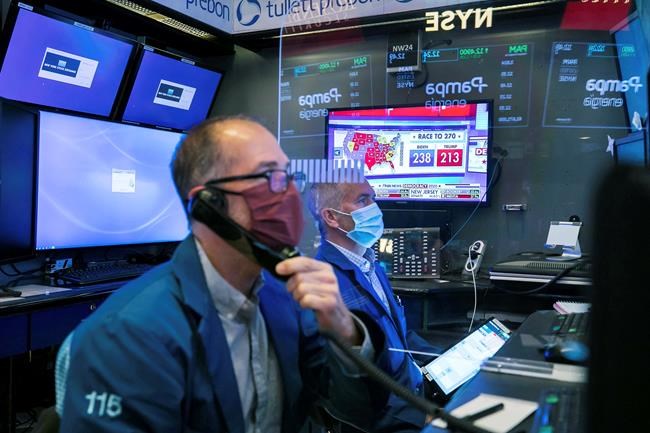How Canadian businesses are navigating U.S. election uncertainty
Advertisement
Read this article for free:
or
Already have an account? Log in here »
To continue reading, please subscribe:
Monthly Digital Subscription
$0 for the first 4 weeks*
- Enjoy unlimited reading on winnipegfreepress.com
- Read the E-Edition, our digital replica newspaper
- Access News Break, our award-winning app
- Play interactive puzzles
*No charge for 4 weeks then price increases to the regular rate of $19.00 plus GST every four weeks. Offer available to new and qualified returning subscribers only. Cancel any time.
Monthly Digital Subscription
$4.75/week*
- Enjoy unlimited reading on winnipegfreepress.com
- Read the E-Edition, our digital replica newspaper
- Access News Break, our award-winning app
- Play interactive puzzles
*Billed as $19 plus GST every four weeks. Cancel any time.
To continue reading, please subscribe:
Add Free Press access to your Brandon Sun subscription for only an additional
$1 for the first 4 weeks*
*Your next subscription payment will increase by $1.00 and you will be charged $16.99 plus GST for four weeks. After four weeks, your payment will increase to $23.99 plus GST every four weeks.
Read unlimited articles for free today:
or
Already have an account? Log in here »
Hey there, time traveller!
This article was published 04/11/2020 (1866 days ago), so information in it may no longer be current.
TORONTO – Canadian business leaders awaiting the results of the U.S. election are re-examining their risk plans and making calls to advisers and political contacts Wednesday.
While they won’t find the much-awaited presidential results in their plans or discussions, there will be some comfort in knowing they have prepared for any outcome and have well-connected contacts at their disposal, experts say.
The routine is all part of navigating a topsy-turvy election, where Joe Biden and Donald Trump are both within winning distance as ballots continue to be counted.

While Canadian companies won’t directly end up under the control of either man, their businesses often bleed into the U.S. and can be impacted by regulatory changes, tariffs, immigration practices and tax policies across the border.
“There really isn’t an industry that’s immune from what happens south of the border. What goes on, goes right to the top very quickly,” said Richard Leblanc, a professor of governance, law and ethics at York University, who often advises companies on risk tolerance.
“Political and regulatory risk is now front and centre for many boards. What you don’t want to do is get caught flat-footed.”
The must vulnerable industries to the election results are those in the oil and gas, raw materials, agriculture and tech sectors that depend on or have heightened levels of interaction with the U.S., Leblanc said.
Most companies, he added, study the most vulnerable parts of their business year-round and pay close attention to what politics, industry conditions and global changes could cause turmoil, but risk planning has taken on a whole new importance in recent years.
Talk of a recession, shifting markets and COVID-19 have all made companies spend even more time on risk-planning and Leblanc has even seen some build “Trump risk” into their preparations because he has a proclivity for targeting and upending companies with no notice over Twitter.
“I’ve even seen public statements that are drafted ahead of time to react, depending on what the president does. I had never seen a risk attributed to a person before, but I have seen that the last three or four years,” he said.
Trump poses a threat to companies that rely on immigration because he has gone after H1B visas and in the past, torn up the North American Free Trade Agreement and imposed tariffs on Canadian aluminum and steel.
“If the Democrats were to win, what that says to most businesses is there’s a little bit more predictability because historically the Democrats have been more likely to be part of bilateral trade agreements and live by the terms of the trade agreements,” said Dennis Darby, chief executive of the Canadian Manufacturers and Exporters, which represents more than 2,500 manufacturers across the country.
But a Biden win has risks too.
Phil Skolnick from Eight Capital Research said in a note to investors Wednesday that a Biden win could be a negative for oil prices and producers because of climate change mandates and the potential for sanctions on Iran to be lifted.
North American pipelines could also face trouble if the Democrats pack the Supreme Court, he said.
Regardless of who wins, the anxiety of it all has almost become the norm for business leaders, said Jim Balsillie, the former BlackBerry Ltd. co-chief executive and current chair of the Council of Canadian Innovators.
“A couple days of uncertainty for Canadian businesses over presidential election results pales in comparison to the uncertainty caused by the USMCA’s ever-looming renewal provisions and then add on top of that the COVID-19 pandemic, steel and softwood lumber tariffs, digital taxation issues; and, overdue pipeline approvals,” he wrote in an email.
“This is all par for the course in a less co-operative, more mercantilist global economy that our businesses now compete in.”
This report by The Canadian Press was first published Nov. 4, 2020.
Companies in this story: (TSX:BB)


